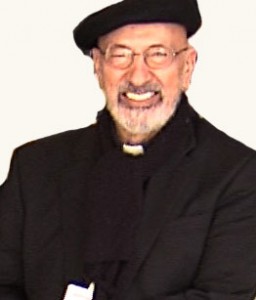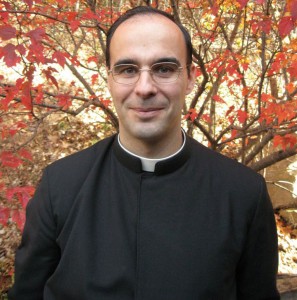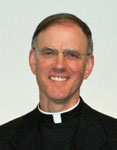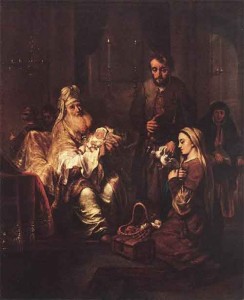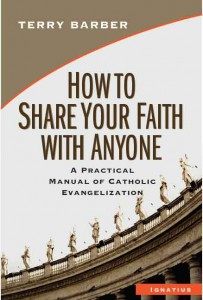Mortal Sin
[powerpress ]
 You know, we shouldn’t kid ourselves that we can’t earn God’s love. That’s about as foolish as a kid down the street trying to earn his way into my family by mowing my lawn every week. To be reborn in Christ is to be adopted as God’s son or daughter, 1 something that could never be purchased or earned.
You know, we shouldn’t kid ourselves that we can’t earn God’s love. That’s about as foolish as a kid down the street trying to earn his way into my family by mowing my lawn every week. To be reborn in Christ is to be adopted as God’s son or daughter, 1 something that could never be purchased or earned.
Nevertheless, there are still certain requirements for remaining part of that family. Just as a child can get himself kicked out of the house or even disinherited, so too we can separate ourselves from God’s grace through what the Church traditionally calls mortal sin.2 These sins can take the form of co-mmission, such as hatred or adultery, or o-mission, such as ignoring those in need or refusing to forgive someone.
Paul exhorts us in 1 Corinthians 10 to not be like the Israelites, who, in spite of having been liberated from the slavery of Egypt, baptized in the Red Sea, and fed with manna from heaven in the desert, failed to enter the Promised Land because of their disobedience.3
So if today you hear his voice, brothers and sisters, harden not your hearts!
1 -Â cf. 1 Jn. 3:1
2 -Â cf. Mt. 7:21; Rom. 6:21; 8:12; 1 Cor. 6:9-10; 7:19; Gal. 5:17-21; Js. 1:15; 1 Jn. 2:4; 3:22; 5:3; Rev. 2:5, 12:17; 14:12;
22:11; etc.
2 -Â 1 Cor. 10:1-6
Tags: catholic, catholic podcast, catholic prayer
This entry was posted on Thursday, February 20th, 2014 at 6:52 am
You can follow any responses to this entry through the RSS 2.0 feed.
How are you tempted? Â What is your weakness? What is the remedy?
Reading 1 Â Â Â JAS 1:12-18
for when he has been proven he will receive the crown of life
that he promised to those who love him.
No one experiencing temptation should say,
“I am being tempted by Godâ€;
for God is not subject to temptation to evil,
and he himself tempts no one.
Rather, each person is tempted when lured and enticed by his desire.
Then desire conceives and brings forth sin,
and when sin reaches maturity it gives birth to death.Do not be deceived, my beloved brothers and sisters:
all good giving and every perfect gift is from above,
coming down from the Father of lights,
with whom there is no alteration or shadow caused by change.
He willed to give us birth by the word of truth
that we may be a kind of first fruits of his creatures
Lectionary for Mass for Use in the Dioceses of the United States, second typical edition, Copyright © 2001, 1998, 1997, 1986, 1970 Confraternity of Christian Doctrine;
Tags: catholic, catholic podcast, catholic prayer
This entry was posted on Tuesday, February 18th, 2014 at 6:37 am
You can follow any responses to this entry through the RSS 2.0 feed.
FG#12 – The Way of Trust and Love Ep 1 – Fountains of Grace: reflections on contemporary spiritual classics with Donna Garrett
Join host Donna Garrett, with Fr. James Perez, LC, as they discuss the spiritual classic “The Way of Trust and Love:Â A Retreat Guided By St. Therese of Lisieux“Â by Fr. Â Jacques Philippe.
[powerpress]
Discussed in this episode, among other topics, Â from “The Way of Trust and Love” page 9
This is what Thérèse said:
You know, Mother, that I have always desired to be a saint, but alas, I have always realized, when I compared myself to the saints, that there is between them and me the same difference as exists between a mountain whose summit is lost in the skies, and the obscure grain of sand trodden underfoot by passers-by. Instead of getting discouraged, I said to myself: “God could not inspire us with desires that were unrealizable, so despite my littleness I can aspire to holiness. It is impossible for me to grow up, I must put up with myself as I am , with all my imperfections; but I want to find how to get to Heaven by a little way that is quite straight, quite short: a completely new little way. We are in an age of inventions; now one doesn’t have to make the effort to climb up a stairway in rich people’s houses, because an elevator does the work much better. I too would like to find an elevator to lift me up to Jesus, for I am too little to climb up the steep stairway of perfection.†Then I looked in the holy books for some sign of the elevator that I desired, and I read these words that had come forth from the mouth of Eternal Wisdom: “Whoever is VERY LITTLE let him come to me†[Proverbs 9: 4]. So I came, guessing that I had found what I sought. Wishing to know, O my God, what you would do for a little child who answered your call, I continued my search and this is what I found: “As a mother caresses her baby, so I will comfort you; I will carry you at my breast and rock you in my lap†[Isaiah 66: 13, 12]. Ah! never had such tender, melodious words come to rejoice my soul; the elevator that would lift me up to Heaven is your arms, O Jesus! To reach perfection, I do not need to grow up. On the contrary, I need to stay little, to become more and more little. O my God, you have surpassed my expectations, and I wish to sing of your mercies.For other episodes in the this series click here “Fountains of Grace w/Donna Garrett“
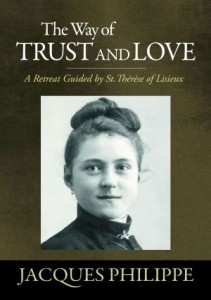
You can find “The Way of Trust and Love” here
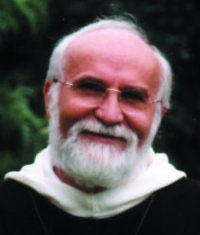
Fr. Jacques Philippe
Tags: catholic, catholic podcast, catholic prayer
This entry was posted on Tuesday, February 18th, 2014 at 12:59 am
You can follow any responses to this entry through the RSS 2.0 feed.
There are three principal reasons why we find ourselves desolate.
The first is, because of our being tepid, lazy or negligent in our spiritual exercises; and so through our faults, spiritual consolation withdraws from us.
The second, to try us and see how much we are and how much we let ourselves out in His service and praise without such great pay of consolation and great graces.
The third, to give us true acquaintance and knowledge, that we may interiorly feel that it is not ours to get or keep great devotion, intense love, tears, or any other spiritual consolation, but that all is the gift and grace of God our Lord, and that we may not build a nest in a thing not ours, raising our intellect into some pride or vainglory, attributing to us devotion or the other things of the spiritual consolation.
[powerpress]
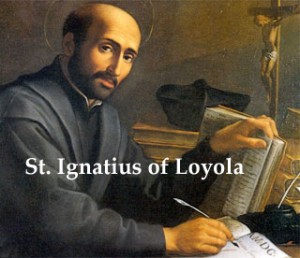 The Discernment of Spirits: Setting the Captives Free – Serves as an introduction to the Spiritual Exercises of St. Ignatius of Loyola
The Discernment of Spirits: Setting the Captives Free – Serves as an introduction to the Spiritual Exercises of St. Ignatius of Loyola
The 14 Rules for Discerning Spirits –
“The Different Movements Which Are Caused In The Soul”
as outlined by St. Ignatius of Loyola can be found here
Father Timothy M. Gallagher, O.M.V., was ordained in 1979 as a member of the Oblates of the Virgin Mary, a religious community dedicated to retreats and spiritual formation according to the Spiritual Exercises of St. Ignatius. Â Fr. Gallagher is featured on the EWTN series “Living the Discerning Life: Â The Spiritual Teachings of St. Ignatius of Loyola”.Â
For more information on how to obtain copies of Fr. Gallaghers’s various books and audio which are available for purchase, please visit  his  website: www.frtimothygallagher.org
 For the other episodes in this series visit
Fr. Timothy Gallagher’s “Discerning Hearts†page
Tags: catholic, catholic podcast, catholic prayer
This entry was posted on Thursday, February 6th, 2014 at 12:41 am
You can follow any responses to this entry through the RSS 2.0 feed.
Episode 18 – The Holy Rule of St. Benedict: A Spiritual Path for Today’s World with Fr. Mauritius Wilde O.S.B., PhD.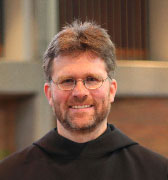
Listening to God’s Voice…Obedience
[powerpress]
From the Holy Rule of St. Benedict:
CHAPTER V
Of ObedienceThe first degree of humility is obedience without delay. This becometh those who, on account of the holy subjection which they have promised, or of the fear of hell, or the glory of life everlasting, hold nothing dearer than Christ. As soon as anything hath been commanded by the Superior they permit no delay in the execution, as if the matter had been commanded by God Himself. Of these the Lord saith: “At the hearing of the ear he hath obeyed Me” (Ps 17[18]:45). And again He saith to the teachers: “He that heareth you heareth Me” (Lk 10:16).Such as these, therefore, instantly quitting their own work and giving up their own will, with hands disengaged, and leaving unfinished what they were doing, follow up, with the ready step of obedience, the work of command with deeds; and thus, as if in the same moment, both matters — the master’s command and the disciple’s finished work — are, in the swiftness of the fear of God, speedily finished together, whereunto the desire of advancing to eternal life urgeth them. They, therefore, seize upon the narrow way whereof the Lord saith: “Narrow is the way which leadeth to life” (Mt 7:14), so that, not living according to their own desires and pleasures but walking according to the judgment and will of another, they live in monasteries, and desire an Abbot to be over them. Such as these truly live up to the maxim of the Lord in which He saith: “I came not to do My own will, but the will of Him that sent Me” (Jn 6:38).This obedience, however, will be acceptable to God and agreeable to men then only, if what is commanded is done without hesitation, delay, lukewarmness, grumbling or complaint, because the obedience which is rendered to Superiors is rendered to God. For He Himself hath said: “He that heareth you heareth Me” (Lk 10:16). And it must be rendered by the disciples with a good will, “for the Lord loveth a cheerful giver (2 Cor 9:7). ” For if the disciple obeyeth with an ill will, and murmureth, not only with lips but also in his heart, even though he fulfil the command, yet it will not be acceptable to God, who regardeth the heart of the murmurer. And for such an action he acquireth no reward; rather he incurreth the penalty of murmurers, unless he maketh satisfactory amendment.
Father Mauritius Wilde, OSB, Ph.D., did his philosophical, theological and doctoral studies in Europe. He is the author of several books and directs retreats regularly. He serves as Prior of our monastery in Schuyler.
 For more information about the ministry of the the Missionary Benedictines of Christ the King Priory in Schuyler, Nebraska visit here:
For more information about the ministry of the the Missionary Benedictines of Christ the King Priory in Schuyler, Nebraska visit here:
Tags: catholic, catholic podcast, catholic prayer
This entry was posted on Monday, February 3rd, 2014 at 10:30 am
You can follow any responses to this entry through the RSS 2.0 feed.
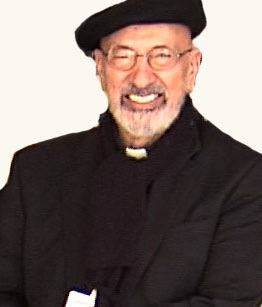 Show 57″ Building a Kingdom of Love” – The Presentation in the Temple
Show 57″ Building a Kingdom of Love” – The Presentation in the Temple
[powerpress]
Msgr. Esseff reflects on the teaching of the Sacred Scriptures for the Feast of the Presentation in the Temple .Do your recognize His Presence?:
Gospel lk 2:22-40
When the days were completed for their purification
according to the law of Moses,
Mary and Joseph took Jesus up to Jerusalem
to present him to the Lord,
just as it is written in the law of the Lord,
Every male that opens the womb shall be consecrated to the Lord,
and to offer the sacrifice of
a pair of turtledoves or two young pigeons,
in accordance with the dictate in the law of the Lord.Now there was a man in Jerusalem whose name was Simeon.
This man was righteous and devout,
awaiting the consolation of Israel,
and the Holy Spirit was upon him.
It had been revealed to him by the Holy Spirit
that he should not see death
before he had seen the Christ of the Lord.
He came in the Spirit into the temple;
and when the parents brought in the child Jesus
to perform the custom of the law in regard to him,
he took him into his arms and blessed God, saying:“Now, Master, you may let your servant go
in peace, according to your word,
for my eyes have seen your salvation,
which you prepared in the sight of all the peoples:
a light for revelation to the Gentiles,
and glory for your people Israel.â€The child’s father and mother were amazed at what was said about him;
and Simeon blessed them and said to Mary his mother,
“Behold, this child is destined
for the fall and rise of many in Israel,
and to be a sign that will be contradicted
—and you yourself a sword will pierce—
so that the thoughts of many hearts may be revealed.â€
There was also a prophetess, Anna,
the daughter of Phanuel, of the tribe of Asher.
She was advanced in years,
having lived seven years with her husband after her marriage,
and then as a widow until she was eighty-four.
She never left the temple,
but worshiped night and day with fasting and prayer.
And coming forward at that very time,
she gave thanks to God and spoke about the child
to all who were awaiting the redemption of Jerusalem.When they had fulfilled all the prescriptions
of the law of the Lord,
they returned to Galilee, to their own town of Nazareth.
The child grew and became strong, filled with wisdom;
and the favor of God was upon him.
Lectionary for Mass for Use in the Dioceses of the United States, second typical edition, Copyright © 2001, 1998, 1997, 1986, 1970 Confraternity of Christian Doctrine;
Msgr. John A. Esseff is a Roman Catholic priest in the Diocese of Scranton. He was ordained on May 30th 1953, by the late Bishop William J. Hafey, D.D. at St. Peter’s Cathedral in Scranton, PA. Msgr. Esseff served a retreat director and confessor to Blessed Mother Teresa. He continues to offer direction and retreats for the sisters of the missionaries of charity around the world. Msgr. Esseff encountered St. Padre Pio, who would become a spiritual father to him. He has lived in areas around the world, serving in the Pontifical missions, a Catholic organization established by Bl. Pope John Paul II to bring the Good News to the world especially to the poor. Msgr. Esseff assisted the founders of the Institute for Priestly Formation and continues to serve as a spiritual director for the Institute. He continues to serve as a retreat leader and director to bishops, priests and sisters and seminarians and other religious leaders around the world.
To obtain a copy of Msgr. Esseff’s book by visiting here
Be sure to visit Msgr. Esseff’s website “Building a Kingdom of Love”
Tags: catholic, catholic podcast, catholic prayer
This entry was posted on Sunday, February 2nd, 2014 at 7:23 am
You can follow any responses to this entry through the RSS 2.0 feed.
Terry Barber is a pioneer in the New Evangelization.  He is the founder of Saint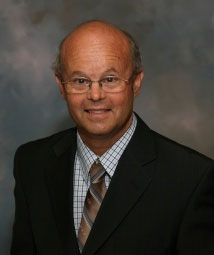 Joseph Communications, Inc., Lighthouse Catholic Media and is a co-host for Reasons for Faith Live with Jesse Romero on EWTN Radio Network. His book, “How to Share Your Faith with Anyone: A Practical Manual of Catholic Evangelization”, is an ideal resource for anyone who desires to share the Good News and become an effective evangelist for Christ.  Immensely practical, Terry’s work is an important addition to the apologetic lexicon.  Our conversation was a joy for me to be a part of.  It’s easy to see why Terry Barber is so great at what he does; his joy, found in his faith, is infectious and grace-filled.
Joseph Communications, Inc., Lighthouse Catholic Media and is a co-host for Reasons for Faith Live with Jesse Romero on EWTN Radio Network. His book, “How to Share Your Faith with Anyone: A Practical Manual of Catholic Evangelization”, is an ideal resource for anyone who desires to share the Good News and become an effective evangelist for Christ.  Immensely practical, Terry’s work is an important addition to the apologetic lexicon.  Our conversation was a joy for me to be a part of.  It’s easy to see why Terry Barber is so great at what he does; his joy, found in his faith, is infectious and grace-filled.
[powerpress]
You can find the book here
“Before it was fashionable to talk about the New Evangelization, Terry Barber was already doing it. His book is a practical manual written from decades in the trenches. After laying the foundation for what evangelism is and why Catholics need to evangelize, the veteran evangelist gives practical training and application to the troops. Soldiers of Christ, grab this book, arise and share your faith!” —Steve Ray. Host, The Footprints of God film series
“Terry Barber has long been one of the Church’s finest evangelists. His excellent book shows us how the new evangelization requires new apologetics – a new way to explain why the Church’s teachings are true and why Jesus is the answer to the deep desires of the human heart.” —Most Reverend Jose Gomez, Archbishop of Los Angeles
Tags: catholic, catholic podcast, catholic prayer
This entry was posted on Thursday, January 23rd, 2014 at 12:00 pm
You can follow any responses to this entry through the RSS 2.0 feed.
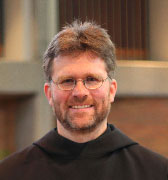 Episode 16 – The Holy Rule of St. Benedict: A Spiritual Path for Today’s World with Fr. Mauritius Wilde O.S.B., PhD.
Episode 16 – The Holy Rule of St. Benedict: A Spiritual Path for Today’s World with Fr. Mauritius Wilde O.S.B., PhD.
The remedy for fear is love
[powerpress]
From the Holy Rule of St. Benedict:
CHAPTER VI
“…Having, therefore, ascended all these degrees of humility, the monk will presently arrive at that love of God, which being perfect, casteth out fear (1 Jn 4:18). In virtue of this love all things which at first he observed not without fear, he will now begin to keep without any effort, and as it were, naturally by force of habit, no longer from the fear of hell, but from the love of Christ, from the very habit of good and the pleasure in virtue. May the Lord be pleased to manifest all this by His Holy Spirit in His laborer now cleansed from vice and sin.”
Father Mauritius Wilde, OSB, Ph.D., did his philosophical, theological and doctoral studies in Europe. He is the author of several books and directs retreats regularly. He serves as Prior of our monastery in Schuyler.
 For more information about the ministry of the the Missionary Benedictines of Christ the King Priory in Schuyler, Nebraska visit here:
For more information about the ministry of the the Missionary Benedictines of Christ the King Priory in Schuyler, Nebraska visit here:
Tags: catholic, catholic podcast, catholic prayer
This entry was posted on Thursday, January 23rd, 2014 at 11:04 am
You can follow any responses to this entry through the RSS 2.0 feed.
Episode 4 – Great Works in Western Literature with Joseph Pearce – Oscar Wilde [powerpress]
[powerpress]
In true Faustian tradition The Picture of Dorian Gray tells the tale of a young man who sells his soul to the devil in return for youthful immortality, only to discover that the “devil’s bargain” is no bargain at all. “What does it profit a man if he gain the whole world and lose his own soul?
 When Dorian Gray is asked this question he knows the answer. He has learned his lesson the hard way and has added the destroyed lives of others into the bargain. The moral is inescapable, making The Picture of Dorian Gray more than merely a classic of Victorian literature. It is a classic of Christian literature also.  Joseph Pearce can speak about the heart and mind of Oscar Wilde in a unique way, he is the author of “The Unmasking of Oscar Wilde”
When Dorian Gray is asked this question he knows the answer. He has learned his lesson the hard way and has added the destroyed lives of others into the bargain. The moral is inescapable, making The Picture of Dorian Gray more than merely a classic of Victorian literature. It is a classic of Christian literature also.  Joseph Pearce can speak about the heart and mind of Oscar Wilde in a unique way, he is the author of “The Unmasking of Oscar Wilde”
 Based on the Ignatius Critical Edition, this series examines, from the Judeo-Christian perspective, the life,the times, and influence of authors of great works in literature .
Based on the Ignatius Critical Edition, this series examines, from the Judeo-Christian perspective, the life,the times, and influence of authors of great works in literature .
Joseph Pearce is currently the Writer-in-Residence and Visiting Fellow at Thomas More College of Liberal Arts in Merrimack, New Hampshire. He is also Visiting Scholar at Mount Royal Academy in Sunapee, New Hampshire. He is also Visiting Scholar at Mount Royal Academy in Sunapee, New Hampshire. He is  co-editor of the Saint Austin Review (or StAR), an international review of Christian culture, literature, and ideas published in England (Family Publications) and the United States (Sapientia Press). He is also the author of many books, including literary biographies of Solzhenitsyn, J. R. R. Tolkien, C. S. Lewis, G. K. Chesterton, and Oscar Wilde.
To learn more about the authors and titles available in the Ignatius Critical Editions
Tags: catholic, catholic podcast, catholic prayer
This entry was posted on Thursday, January 16th, 2014 at 5:11 am
You can follow any responses to this entry through the RSS 2.0 feed.
Dr. Matthew Bunson discusses the life, times and teachings of St. Cyril of Alexandria
[powerpress]
-
Born: 378 AD, Alexandria, Egypt
-
Died: June 27, 444 AD, Alexandria, Egypt
Cyril’s writings – truly numerous and already widely disseminated in various Latin and Eastern translations in his own lifetime, attested to by their instant success – are of the utmost importance for the history of Christianity. His commentaries on many of the New and Old Testament Books are important, including those on the entire Pentateuch, Isaiah, the Psalms and the Gospels of John and Luke. Also important are his many doctrinal works, in which the
defence of the Trinitarian faith against the Arian and Nestorian theses recurs. The basis of Cyril’s teaching is the ecclesiastical tradition and in particular, as I mentioned, the writings of Athanasius, his great Predecessor in the See of Alexandria. Among Cyril’s other writings, the books Against Julian deserve mention. They were the last great response to the anti-Christian controversies, probably dictated by the Bishop of Alexandria in the last years of his life to respond to the work Against the Galileans, composed many years earlier in 363 by the Emperor known as the “Apostate” for having abandoned the Christianity in which he was raised.
The Christian faith is first and foremost the encounter with Jesus, “a Person, which gives life a new horizon” (Deus Caritas Est, n. 1). St Cyril of Alexandria was an unflagging, staunch witness of Jesus Christ, the Incarnate Word of God, emphasizing above all his unity, as he repeats in 433 in his first letter (PG 77, 228-237) to Bishop Succensus: “Only one is the Son, only one the Lord Jesus Christ, both before the Incarnation and after the Incarnation. Indeed, the Logos born of God the Father was not one Son and the one born of the Blessed Virgin another; but we believe that the very One who was born before the ages was also born according to the flesh and of a woman”. Over and above its doctrinal meaning, this assertion shows that faith in Jesus the Logos born of the Father is firmly rooted in history because, as St Cyril affirms, this same Jesus came in time with his birth from Mary, the Theotò-kos, and in accordance with his promise will always be with us. And this is important: God is eternal, he is born of a woman, and he stays with us every day. In this trust we live, in this trust we find the way for our life.
For more visit Vatican.va
Dr. Matthew Bunson, Senior Fellow of the St. Paul Center for Biblical Theology, is one of the United States’ leading authorities on the papacy and the Church.
His books include: The Encyclopedia of Catholic History; The Encyclopedia of Saints; Papal Wisdom; All Shall Be Well; Encyclopedia of the Roman Empire; and The Angelic Doctor: The Life and World of St. Thomas Aquinas; The Pope Encyclopedia; We Have a Pope! Benedict XVI, the first Catholic biography of the Holy Father in the English language; the Encyclopedia of U.S. Catholic History; Pope Francis. His also the editor of OSV’s “The Catholic Answer” magazine.
Tags: catholic, catholic podcast, catholic prayer, cathollc spirituality, jesus christ, matthew bunson
This entry was posted on Sunday, January 12th, 2014 at 5:36 pm
You can follow any responses to this entry through the RSS 2.0 feed.
This is the best biography I have read in years! Â What a glorious testament to the fruitfulness of the Benedictine rule and how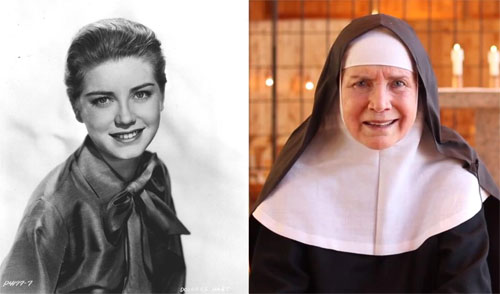 it transforms lives. Â Mother Dolores Hart brings to us a generous sharing of her life experience and the joy found in the peace and stability in the living with her monastic community. Â How could a woman walk away from “having it all”? Â Mother Dolores discovered the “pearl of great price”, and she found it by listening to the “ear of the heart”. Â An absolutely fantastic read and spiritually fulfilling work. Â A must read!!!! Â This conversation will go down as one of my favorites of all time!!! Â Thank you God!!!
it transforms lives. Â Mother Dolores Hart brings to us a generous sharing of her life experience and the joy found in the peace and stability in the living with her monastic community. Â How could a woman walk away from “having it all”? Â Mother Dolores discovered the “pearl of great price”, and she found it by listening to the “ear of the heart”. Â An absolutely fantastic read and spiritually fulfilling work. Â A must read!!!! Â This conversation will go down as one of my favorites of all time!!! Â Thank you God!!!
[powerpress]
 You can find the book here
You can find the book here
“What a joy to be in the company of Mother Dolores Hart. She is a compassionate narrator, from her childhood days, darkened by parental alcoholism, to her Hollywood career and her calling as a Catholic nun. Mother Dolores talks candidly about the difficulty of becoming a cloistered, Benedictine nun. The struggle with years of discipline and the rigorous farm work at the Abbey of Regina Laudis. We learn there was something in her deepest heart she sought.” — —-Pia Lindstrom, television journalist, daughter of Ingrid Bergman
“Listen and attend with the ear of your heart.”
Saint Benedict
“Mother Dolores Hart is a remarkable woman with a remarkable story-one of love, devotion and faith.”
—Maria Shriver, bestselling author of Just Who Will You Be?
Tags: catholic, catholic podcast, catholic prayer
This entry was posted on Tuesday, December 31st, 2013 at 6:56 am
You can follow any responses to this entry through the RSS 2.0 feed.
Episode 6 -The Fourth Rule: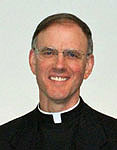
Of Spiritual Desolation. I call desolation all the contrary of the third rule, such as darkness of soul, disturbance in it, movement to things low and earthly, the unquiet of different agitations and temptations, moving to want of confidence, without hope, without love, when one finds oneself all lazy, tepid, sad, and as if separated from his Creator and Lord.
Because, as consolation is contrary to desolation, in the same way the thoughts which come from consolation are contrary to the thoughts which come from desolation.
[powerpress]
 The Discernment of Spirits: Setting the Captives Free – Serves as an introduction to the Spiritual Exercises of St. Ignatius of Loyola
The Discernment of Spirits: Setting the Captives Free – Serves as an introduction to the Spiritual Exercises of St. Ignatius of Loyola
The 14 Rules for Discerning Spirits –
“The Different Movements Which Are Caused In The Soul”
as outlined by St. Ignatius of Loyola
can be found here
Father Timothy M. Gallagher, O.M.V., was ordained in 1979 as a member of the Oblates of the Virgin Mary, a religious community dedicated to retreats and spiritual formation according to the Spiritual Exercises of St. Ignatius. Â Fr. Gallagher is featured on the EWTN series “Living the Discerning Life: Â The Spiritual Teachings of St. Ignatius of Loyola”.Â
For more information on how to obtain copies of Fr. Gallaghers’s various books and audio which are available for purchase, please visit  his  website: www.frtimothygallagher.org
 For the other episodes in this series visit
Fr. Timothy Gallagher’s “Discerning Hearts†page
Tags: catholic, catholic podcast, catholic prayer
This entry was posted on Saturday, December 28th, 2013 at 5:53 pm
You can follow any responses to this entry through the RSS 2.0 feed.
In the persons who are going on intensely cleansing their sins and rising from good to better in the service of God our Lord, it is the method contrary to that in the first Rule, for then it is the way of the evil spirit to bite, sadden and put obstacles, disquieting with false reasons, that one may not go on; and it is proper to the good to give courage and strength, consolations, tears, inspirations and quiet, easing, and putting away all obstacles, that one may go on in well doing.
[powerpress]
 The Discernment of Spirits: Setting the Captives Free – Serves as an introduction to the Spiritual Exercises of St. Ignatius of Loyola
The Discernment of Spirits: Setting the Captives Free – Serves as an introduction to the Spiritual Exercises of St. Ignatius of Loyola
The 14 Rules for Discerning Spirits –
“The Different Movements Which Are Caused In The Soul”
as outlined by St. Ignatius of Loyola
can be found here
Father Timothy M. Gallagher, O.M.V., was ordained in 1979 as a member of the Oblates of the Virgin Mary, a religious community dedicated to retreats and spiritual formation according to the Spiritual Exercises of St. Ignatius. Â Fr. Gallagher is featured on the EWTN series “Living the Discerning Life: Â The Spiritual Teachings of St. Ignatius of Loyola”.Â
For more information on how to obtain copies of Fr. Gallaghers’s various books and audio which are available for purchase, please visit  his  website: www.frtimothygallagher.org
 For the other episodes in this series visit
Fr. Timothy Gallagher’s “Discerning Hearts†page
Tags: catholic, catholic podcast, catholic prayer
This entry was posted on Monday, December 2nd, 2013 at 2:31 pm
You can follow any responses to this entry through the RSS 2.0 feed.
Dr. Matthew Bunson discusses the life, times and teachings of St. Jerome
[powerpress]
Jerome
-Â Letters
-Â The Perpetual Virginity of Blessed Mary
-Â To Pammachius Against John of Jerusalem
-Â The Dialogue Against the Luciferians
-Â The Life of Malchus, the Captive Monk
-Â The Life of S. Hilarion
-Â The Life of Paulus the First Hermit
-Â Against Jovinianus
-Â Against Vigilantius
-Â Against the Pelagians
-Â Prefaces
-Â De Viris Illustribus (Illustrious Men)
-Â Apology for himself against the Books of Rufinus
Jerome was born into a Christian family in about 347 A.D. in Stridon. He was given a good education and was even sent to Rome to fine-tune his studies. As a young man he was attracted by the worldly life (cf. Ep 22, 7), but his desire for and interest in the Christian religion prevailed.
He received Baptism in about 366 and opted for the ascetic life. He went to Aquileia and joined a group of fervent Christians that had formed around Bishop Valerian and which he described as almost “a choir of blesseds” (Chron. ad ann. 374). He then left for the East and lived as a hermit in the Desert of Chalcis, south of Aleppo (Ep 14, 10), devoting himself assiduously to study. He perfected his knowledge of Greek, began learning Hebrew (cf. Ep 125, 12), and transcribed codices and Patristic writings (cf. Ep 5, 2). Meditation, solitude and contact with the Word of God helped his Christian sensibility to mature. He bitterly regretted the indiscretions of his youth (cf. Ep. 22, 7) and was keenly aware of the contrast between the pagan mentality and the Christian life: a contrast made famous by the dramatic and lively “vision” – of which he has left us an account – in which it seemed to him that he was being scourged before God because he was “Ciceronian rather than Christian” (cf. Ep. 22, 30).In 382 he moved to Rome: here, acquainted with his fame as an ascetic and his ability as a scholar, Pope Damasus engaged him as secretary and counsellor; the Pope encouraged him, for pastoral and cultural reasons, to embark on a new Latin translation of the Biblical texts. Several members of the Roman aristocracy, especially noblewomen such as Paula, Marcella, Asella, Lea and others, desirous of committing themselves to the way of Christian perfection and of deepening their knowledge of the Word of God, chose him as their spiritual guide and teacher in the methodical approach to the sacred texts. These noblewomen also learned Greek and Hebrew.
After the death of Pope Damasus, Jerome left Rome in 385 and went on pilgrimage, first to the Holy Land, a silent witness of Christ’s earthly life, and then to Egypt, the favourite country of numerous monks (cf. Contra Rufinum, 3, 22; Ep. 108, 6-14). In 386 he stopped in Bethlehem, where male and female monasteries were built through the generosity of the noblewoman, Paula, as well as a hospice for pilgrims bound for the Holy Land, “remembering Mary and Joseph who had found no room there” (Ep. 108, 14).
He stayed in Bethlehem until he died, continuing to do a prodigious amount of work: he commented on the Word of God; he defended the faith, vigorously opposing various heresies; he urged the monks on to perfection; he taught classical and Christian culture to young students; he welcomed with a pastor’s heart pilgrims who were visiting the Holy Land. He died in his cell close to the Grotto of the Nativity on 30 September 419-420.
Jerome’s literary studies and vast erudition enabled him to revise and translate many biblical texts: an invaluable undertaking for the Latin Church and for Western culture. On the basis of the original Greek and Hebrew texts, and thanks to the comparison with previous versions, he revised the four Gospels in Latin, then the Psalter and a large part of the Old Testament. Taking into account the original Hebrew and Greek texts of the Septuagint, the classical Greek version of the Old Testament that dates back to pre-Christian times, as well as the earlier Latin versions, Jerome was able, with the assistance later of other collaborators, to produce a better translation: this constitutes the so-called “Vulgate”, the “official” text of the Latin Church which was recognized as such by the Council of Trent and which, after the recent revision, continues to be the “official” Latin text of the Church. It is interesting to point out the criteria which the great biblicist abided by in his work as a translator. He himself reveals them when he says that he respects even the order of the words of the Sacred Scriptures, for in them, he says, “the order of the words is also a mystery” (Ep. 57, 5), that is, a revelation. Furthermore, he reaffirms the need to refer to the original texts: “Should an argument on the New Testament arise between Latins because of interpretations of the manuscripts that fail to agree, let us turn to the original, that is, to the Greek text in which the New Testament was written. “Likewise, with regard to the Old Testament, if there are divergences between the Greek and Latin texts we should have recourse to the original Hebrew text; thus, we shall be able to find in the streams all that flows from the source” (Ep. 106, 2). Jerome also commented on many biblical texts. For him the commentaries had to offer multiple opinions “so that the shrewd reader, after reading the different explanations and hearing many opinions – to be accepted or rejected – may judge which is the most reliable, and, like an expert moneychanger, may reject the false coin” (Contra Rufinum 1, 16).
Jerome refuted with energy and liveliness the heretics who contested the tradition and faith of the Church. He also demonstrated the importance and validity of Christian literature, which had by then become a real culture that deserved to be compared with classical literature: he did so by composing his De Viris Illustribus, a work in which Jerome presents the biographies of more than a hundred Christian authors. Further, he wrote biographies of monks, comparing among other things their spiritual itineraries as well as monastic ideal. In addition, he translated various works by Greek authors. Lastly, in the important Epistulae, a masterpiece of Latin literature, Jerome emerges with the profile of a man of culture, an ascetic and a guide of souls.
What can we learn from St Jerome? It seems to me, this above all; to love the Word of God in Sacred Scripture. St Jerome said: “Ignorance of the Scriptures is ignorance of Christ”. It is therefore important that every Christian live in contact and in personal dialogue with the Word of God given to us in Sacred Scripture. This dialogue with Scripture must always have two dimensions: on the one hand, it must be a truly personal dialogue because God speaks with each one of us through Sacred Scripture and it has a message for each one. We must not read Sacred Scripture as a word of the past but as the Word of God that is also addressed to us, and we must try to understand what it is that the Lord wants to tell us. However, to avoid falling into individualism, we must bear in mind that the Word of God has been given to us precisely in order to build communion and to join forces in the truth on our journey towards God. Thus, although it is always a personal Word, it is also a Word that builds community, that builds the Church. We must therefore read it in communion with the living Church. The privileged place for reading and listening to the Word of God is the liturgy, in which, celebrating the Word and making Christ’s Body present in the Sacrament, we actualize the Word in our lives and make it present among us. We must never forget that the Word of God transcends time. Human opinions come and go. What is very modern today will be very antiquated tomorrow. On the other hand, the Word of God is the Word of eternal life, it bears within it eternity and is valid for ever. By carrying the Word of God within us, we therefore carry within us eternity, eternal life.
I thus conclude with a word St Jerome once addressed to St Paulinus of Nola. In it the great exegete expressed this very reality, that is, in the Word of God we receive eternity, eternal life. St Jerome said: “Seek to learn on earth those truths which will remain ever valid in Heaven” (Ep. 53, 10).
For more visit Vatican.va
Dr. Matthew Bunson, Senior Fellow of the St. Paul Center for Biblical Theology, is one of the United States’ leading authorities on the papacy and the Church.
His books include: The Encyclopedia of Catholic History; The Encyclopedia of Saints; Papal Wisdom; All Shall Be Well; Encyclopedia of the Roman Empire; and The Angelic Doctor: The Life and World of St. Thomas Aquinas; The Pope Encyclopedia; We Have a Pope! Benedict XVI, the first Catholic biography of the Holy Father in the English language; the Encyclopedia of U.S. Catholic History; Pope Francis. His also the editor of OSV’s “The Catholic Answer” magazine.
Tags: catholic, catholic podcast, catholic prayer, cathollc spirituality, Church, matthew bunson, sacred scripture, St Jerome
This entry was posted on Monday, November 25th, 2013 at 9:53 am
You can follow any responses to this entry through the RSS 2.0 feed.
Dr. Matthew Bunson discusses the life, times and teachings of St. Augustine of Hippo (part 1)
[powerpress]
Augustine of Hippo [
-Â Confessions
-Â Letters
-Â City of God
-Â Christian Doctrine
-Â On the Holy Trinity
-Â The Enchiridion
-Â On the Catechising of the Uninstructed
-Â On Faith and the Creed
-Â Concerning Faith of Things Not Seen
-Â On the Profit of Believing
-Â On the Creed: A Sermon to Catechumens
-Â On Continence
-Â On the Good of Marriage
-Â On Holy Virginity
-Â On the Good of Widowhood
-Â On Lying
-Â To Consentius: Against Lying
-Â On the Work of Monks
-Â On Patience
-Â On Care to be Had For the Dead
-Â On the Morals of the Catholic Church
-Â On the Morals of the Manichaeans
-Â On Two Souls, Against the Manichaeans
-Â Acts or Disputation Against Fortunatus the Manichaean
-Â Against the Epistle of Manichaeus Called Fundamental
-Â Reply to Faustus the Manichaean
-Â Concerning the Nature of Good, Against the Manichaeans
-Â On Baptism, Against the Donatists
-Â Answer to Letters of Petilian, Bishop of Cirta
-Â Merits and Remission of Sin, and Infant Baptism
-Â On the Spirit and the Letter
-Â On Nature and Grace
-Â On Man’s Perfection in Righteousness
-Â On the Proceedings of Pelagius
-Â On the Grace of Christ, and on Original Sin
-Â On Marriage and Concupiscence
-Â On the Soul and its Origin
-Â Against Two Letters of the Pelagians
-Â On Grace and Free Will
-Â On Rebuke and Grace
-Â The Predestination of the Saints/Gift of Perseverance
-Â Our Lord’s Sermon on the Mount
-Â The Harmony of the Gospels
-Â Sermons on Selected Lessons of the New Testament
-Â Tractates on the Gospel of John
-Â Homilies on the First Epistle of John
-Â Soliloquies
-Â The Enarrations, or Expositions, on the Psalms
n Milan, Augustine acquired the habit of listening – at first for the purpose of enriching his rhetorical baggage – to the eloquentpreaching of Bishop Ambrose, who had been a representative of the Emperor for Northern Italy. The African rhetorician was fascinated by the words of the great Milanese Prelate; and not only by his rhetoric. It was above all the content that increasingly touched Augustine’s heart. The great difficulty with the Old Testament, because of its lack of rhetorical beauty and lofty philosophy was resolved in St Ambrose’s preaching through his typological interpretation of the Old Testament: Augustine realized that the whole of the Old Testament was a journey toward Jesus Christ. Thus, he found the key to understanding the beauty and even the philosophical depth of the Old Testament and grasped the whole unity of the mystery of Christ in history, as well as the synthesis between philosophy, rationality and faith in the Logos, in Christ, the Eternal Word who was made flesh.
Augustine soon realized that the allegorical interpretation of Scripture and the Neo-Platonic philosophy practised by the Bishop of Milan enabled him to solve the intellectual difficulties which, when he was younger during his first approach to the biblical texts, had seemed insurmountable to him.
Thus, Augustine followed his reading of the philosophers’ writings by reading Scripture anew, especially the Pauline Letters. His conversion to Christianity on 15 August 386 therefore came at the end of a long and tormented inner journey – of which we shall speak in another catechesis -, and the African moved to the countryside, north of Milan by Lake Como – with his mother Monica, his son Adeodatus and a small group of friends – to prepare himself for Baptism. So it was that at the age of 32 Augustine was baptized by Ambrose in the Cathedral of Milan on 24 April 387, during the Easter Vigil.
For more visit Vatican.va
Dr. Matthew Bunson, Senior Fellow of the St. Paul Center for Biblical Theology, is one of the United States’ leading authorities on the papacy and the Church.
His books include: The Encyclopedia of Catholic History; The Encyclopedia of Saints; Papal Wisdom; All Shall Be Well; Encyclopedia of the Roman Empire; and The Angelic Doctor: The Life and World of St. Thomas Aquinas; The Pope Encyclopedia; We Have a Pope! Benedict XVI, the first Catholic biography of the Holy Father in the English language; the Encyclopedia of U.S. Catholic History; Pope Francis. His also the editor of OSV’s “The Catholic Answer” magazine.
Tags: beauty, catholic, catholic podcast, catholic prayer, cathollc spirituality, Church, matthew bunson, old testament, Pauline Letters
This entry was posted on Friday, November 8th, 2013 at 9:05 am
You can follow any responses to this entry through the RSS 2.0 feed.

